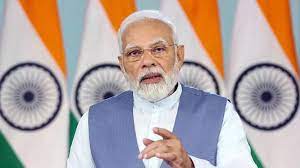SILICON VALLEY, June 5: It is a lot easier now for global companies, especially in technology zones, to establish a footprint in India compared to a decade ago due to the Modi Government’s big focus on attracting the FDI from tech companies, according to the newly-appointed Indian-American president of a US firm that pioneers in managing electronic agreements.
The remarks by Robert Chatwani, president & general manager, Growth at DocuSign came as he spoke about the adoption of technology for governance and other areas in India.
“My understanding is that all of that legislation has come under Narendra Modi’s administration. I think it’s just one indication of how technology and adopting technology, not only for the Government but just at large, has really changed under Prime Minister Modi’s leadership in the last several years,” Chatwani told PTI in an interview.
Encouraged by the changing technological environment, DocuSign, a San Francisco-based company that allows organisations to manage electronic agreements, has announced it is committed to building a full engineering centre and development centre in India. It would come up in Bangalore, he said.
“We are really excited about the market, not just because of the employee base, we’ll build there, but also because of the market opportunity for DocuSign,” said Chatwani, who took over as the president of the company some 90 days ago.
Before joining DocuSign, Chatwani served as the Chief Marketing Officer at Atlassian, a SaaS industry leader and pioneer in product-led growth.
He oversaw teams across marketing, brand, communications and data science, and worked with the product organisation to help scale Atlassian’s business to nearly USD3 billion in revenue. Prior to Atlassian, he served as Chief Revenue & Marketing Officer for the social e-commerce platform Spring.
He also spent more than a decade at eBay, ending his tenure as CMO of North America where his teams supported USD 35 billion in annual trading volume.
“I’ve been lucky to be in multiple companies where we’ve had deep investments in India. One is at eBay where we made a big acquisition in India many years ago and opened our India development centres, eBay and PayPal. My last company, Atlassian, which is an Australian-based company, we now have close to 2,500 employees in India,” he said.
“And DocuSign, which we haven’t opened our office yet, but it’s coming this year. What I’ll say, in every one of those examples, compared to even a decade or more ago, it’s becoming a lot easier for global companies to establish a footprint there, especially in these technology zones, in particular, the companies I have been …., in Chennai, Bangalore, or Hyderabad,” Chatwani told PTI.
“It’s no longer just a cost factor, but really access to talent. Some of the best talents in each of these companies, and hopefully now at DocuSign, come out as a result of our footprint in India. My sense is that under the Modi administration, attracting foreign direct investment from technology companies has been a big focus, and certainly we’ve benefited quite a bit from that,” Chatwani said.
But at the same time, he noted that while from a large company perspective, probably it’s quite easy, for small to midsize companies, it is still a struggle.
“In my last company, Atlassian, we had a network of partners that were much smaller companies, but they would build their technology in our platform, and they attempted to also build India footprint, oftentimes to get, software development cycles going 24 hours and I’ve heard firsthand from at least one of them that they struggled because, as a smaller company of maybe under 500 or under a thousand employees, they found it a lot more difficult to get established and get a footprint in India,” he said.
“So, I’m guessing this is secondhand, that there’s still a lot more efficiency to be had for companies that may not have the resources of a publicly traded company, to get started and to do business in India. That’s just my sense. I think there are still ways to go before it is truly frictionless,” he said.
Responding to a question, Chatwani said everything that he has sensed is that it has only gotten easier to do business and transact with India. (PTI)


